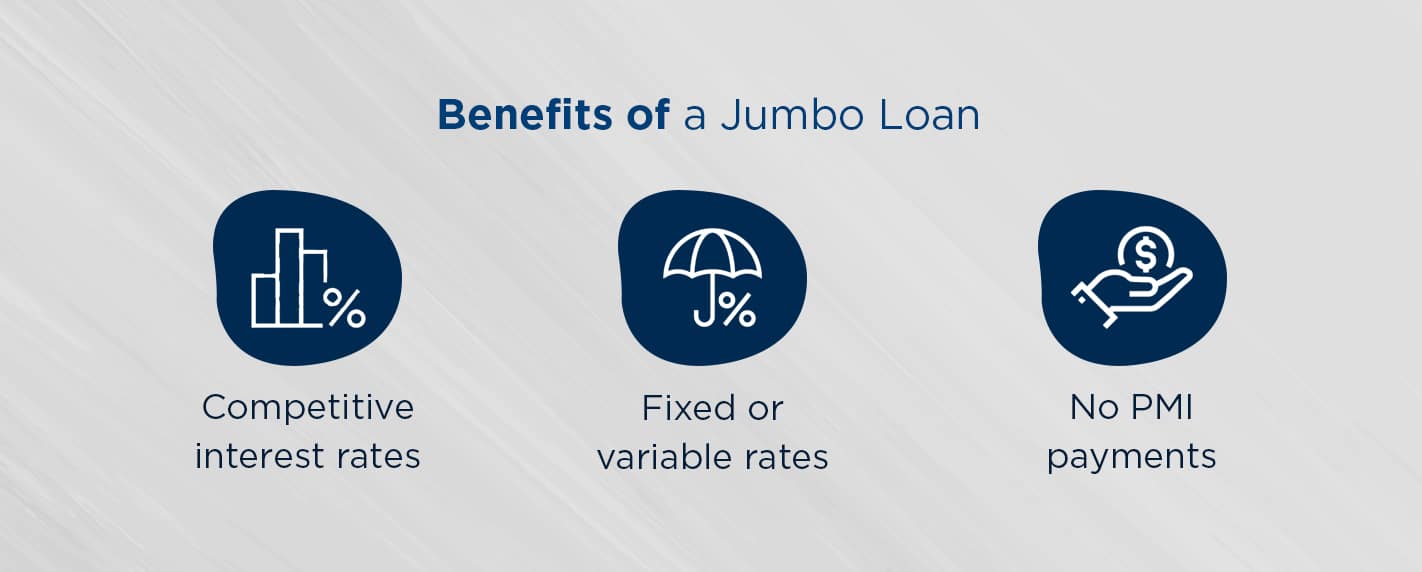Optimize Your Buying Power with a Jumbo Loan for High-End Residences
Optimize Your Buying Power with a Jumbo Loan for High-End Residences
Blog Article
Checking Out the Perks and Features of Jumbo Loans for Your Next Home Acquisition Choice
As the actual estate market progresses, understanding the intricacies of jumbo loans ends up being progressively pertinent for prospective homebuyers taking into consideration high-value residential properties. These finances not only help with considerable funding yet also supply a number of benefits, such as affordable rate of interest and the possible removal of personal mortgage insurance coverage. However, the course to safeguarding a big finance is laden with particular eligibility requirements that may challenge some buyers. To completely value exactly how jumbo loans can affect your home purchase approach, it is necessary to explore their key features and advantages in better information.
What Is a Jumbo Car Loan?

Jumbo lendings are frequently used by purchasers looking for to purchase high-value residential or commercial properties or homes in expensive markets. jumbo loan. Provided the larger quantities obtained, lenders generally enforce stricter credit report needs, including higher credit report, reduced debt-to-income proportions, and larger down repayments. The rates of interest on jumbo lendings might be somewhat greater than those on adapting car loans, reflecting the enhanced threat for loan providers
Additionally, the approval procedure for a jumbo loan can be more intricate and lengthy, as loan providers need extensive documents to evaluate the customer's economic stability. Understanding these subtleties is essential for possible home owners thinking about a jumbo car loan for their residential property funding demands.
Trick Advantages of Jumbo Fundings
One substantial benefit of jumbo lendings is their capacity to finance higher-priced residential or commercial properties that surpass adapting financing limits. This attribute makes them an appealing choice for purchasers looking to buy high-end homes or residential properties in high-cost areas where prices typically surpass standard loan thresholds.
In addition, big lendings usually come with adaptable terms and affordable rate of interest, allowing customers to tailor their financing to match their special monetary situations. jumbo loan. This adaptability can consist of alternatives for adjustable-rate home mortgages (ARMs) or fixed-rate finances, giving purchasers with the ability to manage their month-to-month settlements according to their preferences
One more benefit is that big loans do not require private home mortgage insurance (PMI), which can dramatically decrease the total price of the loan. With PMI usually being a substantial expense for traditional financings with reduced deposits, preventing it can lead to substantial cost savings with time.
Furthermore, borrowers of big car loans usually have accessibility to higher car loan quantities, allowing them to buy properties that meet their way of life needs. This access empowers customers to act emphatically in affordable property markets, securing their preferred homes better. In general, big car loans use essential benefits for those looking for to finance costs buildings.
Eligibility Demands for Jumbo Financings
Jumbo car loans feature certain eligibility needs that potential debtors have to meet to safeguard financing for high-value homes. Unlike standard lendings, which have established limits based upon the adjusting funding limits developed by government-sponsored entities, big fundings go beyond these limits, requiring more stringent requirements.

Additionally, jumbo financings typically demand a substantial down repayment, usually ranging from 10% to 20% of the purchase cost, depending on the loan provider's plans and the debtor's monetary situation. Satisfying these eligibility demands can position borrowers favorably in securing a jumbo loan for their wanted residential or commercial property.
Contrasting Jumbo Fundings to Traditional Financings
Comprehending the differences in between conventional car loans and jumbo fundings is vital for property buyers navigating the premium realty market. Big lendings go beyond the adjusting car loan limits established by the Federal Real Estate Money Firm (FHFA), which suggests they are not eligible for acquisition by Fannie Mae or Freddie Mac. This leads to different underwriting criteria and requirements for consumers.
On the other hand, conventional loans usually follow these restrictions, allowing for an extra streamlined approval procedure. Jumbo car loans often need stricter credit history, larger down repayments, and higher monetary reserves. While a traditional loan could call for a down settlement of as little as 3% to 5%, big fundings normally demand a minimum of 10% to 20%.
Rate of interest on big car loans might differ from those of traditional financings, usually being a little higher because of the increased danger loan providers think - jumbo loan. The potential for substantial funding can be useful for customers seeking luxury residential or commercial properties. Inevitably, recognizing these differences enables property buyers to make educated decisions, aligning their funding alternatives with their special buying demands and financial conditions
Tips for Securing a Jumbo Funding
Safeguarding a big go to these guys financing needs cautious planning and prep work, as loan providers typically impose stricter requirements contrasted to conventional financings. To improve your opportunities of authorization, start by checking your credit report and resolving any issues. A rating of 700 or higher is normally chosen, as it demonstrates credit reliability.
Next, gather your monetary documents, consisting of income tax return, W-2s, and financial institution declarations. Lenders usually need extensive evidence of earnings and possessions to analyze your capability to pay off the lending. Preserving a reduced debt-to-income (DTI) ratio is likewise vital; aim for a DTI below 43% to improve your application's competitiveness.
Additionally, think about making a larger deposit. Many loan providers look for at the very least 20% down for jumbo finances, which not just decreases your funding quantity however additionally signals economic stability. Involving with a well-informed mortgage broker can offer vital understandings into the process and help you navigate different lending institution options.

Conclusion
In recap, big finances present considerable advantages for homebuyers seeking residential properties that surpass traditional funding limitations. With competitive rates of interest, adaptable terms, and the lack of private home loan insurance policy, these fundings can result in considerable cost savings. Potential customers should navigate more stringent eligibility requirements to obtain beneficial terms. Extensive understanding of both the benefits and demands associated with jumbo fundings is necessary for making notified home acquisition choices in a competitive property market.
The passion prices on big loans may be somewhat higher than those on adjusting lendings, showing the raised threat for loan providers.
While a conventional financing may require a down payment of as little as 3% to 5%, big lendings usually demand a minimum of 10% to 20%.
Rate of interest prices on jumbo financings may vary from those of conventional finances, usually being slightly greater due to the enhanced risk lending institutions assume.Protecting a jumbo lending needs mindful planning and prep work, as lending institutions often enforce stricter demands contrasted to conventional financings. Several lenders seek at the very least 20% down for big fundings, which not only lowers your loan quantity however view website also signals economic security.
Report this page